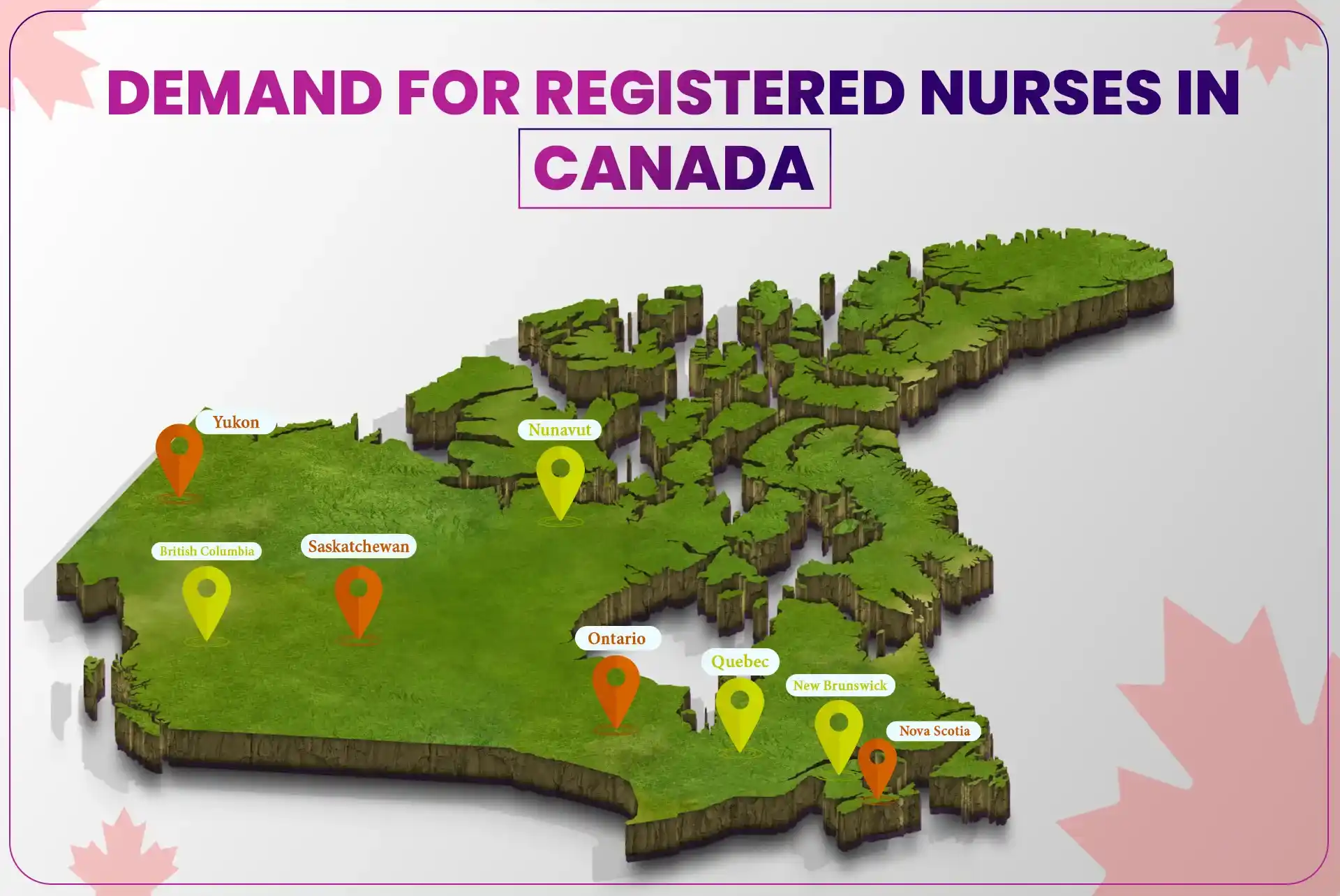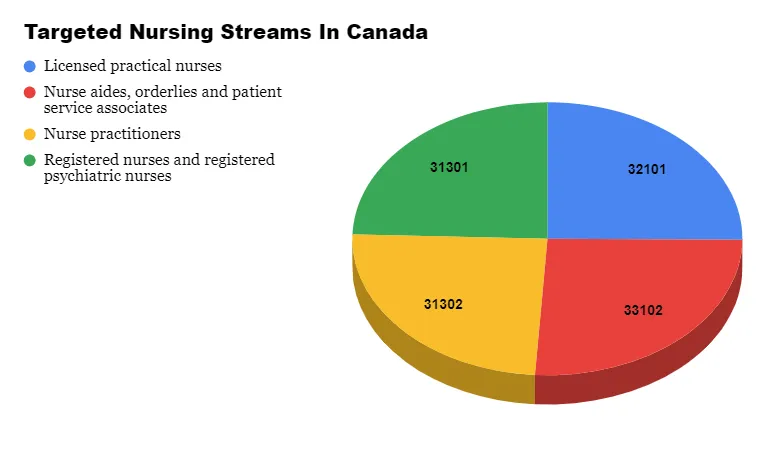Immigration Process For Nurses
Last Updated On : July 05 , 2024
Nursing students aspiring to build careers in Canada are met with a comprehensive educational journey. Canadian nursing programs offer an extensive curriculum that imparts theoretical knowledge and emphasizes practical skills through clinical experiences. The flexibility of these programs allows students to specialize in fields like pediatrics, geriatrics, and critical care, catering to their individual interests and career aspirations. With a strong emphasis on patient-centered care and evidence-based practice, these programs produce well-rounded nursing professionals equipped to excel in the diverse and dynamic healthcare landscape.
Ontario Immigration Updates For Nurses
The Canadian immigration Process for Nurses applying through the Human Capital Priorities (HCP) and the French-speaking skilled Worker (FSSW) streams has been significantly improved, making the journey easier and more promising.
As per Ontario Regulation 422/17(General), the Ontario government is less focused on educational requirements and more on nurses matching the following two conditions.
- Need to be registered by the College of Nurses Ontario (CNO).
- NOC code should be 31300, 31301, 31302, 32101.
Step-by-step guide for immigrating to Canada as a nurse
Moving to Canada as a nurse involves carefully planned steps encompassing the immigration process and the professional transition into the Canadian healthcare system. This comprehensive guide provides an in-depth understanding of the journey, ensuring aspiring nurses are well-prepared to transition to Canada.
1. Research and Assess Eligibility:
The first step is to research the National Occupational Classification (NOC) code for nurses, usually classified as NOC 3012. This code categorizes nursing professions and helps determine eligibility for immigration programs. Candidates should assess their eligibility for the Federal Skilled Worker Program (FSWP) or Provincial Nominee Program (PNP) pathways.
2. Language Proficiency:
Demonstrating language proficiency is crucial for successful immigration to Canada. Most applicants are required to prove their English or French language skills through recognized language tests like IELTS or PTE. Meeting the required language scores is essential to proceed further in the immigration process.
3. Education and Credential Assessment:
Validating your educational qualification is critical step Accrediredential assessment agencies evaluate your nursing education against Canadian standards, ensuring its compatibility with the Canadian system. This assessment enhances your credibility and demonstrates your competence with Canadian immigration authorities
4. Create an Express Entry Profile:
If you meet the eligibility criteria, creating an Express Entry profile is the next step. This online platform allows candidates to enter a pool of potential immigrants. Your profile is then ranked based on age, education, work experience, and language proficiency. A high-ranking profile increases your chances of receiving an Invitation to Apply (ITA) for permanent residency.
5. Receive an Invitation to Apply (ITA):
Candidates with top-ranking profiles in the Express Entry pool are issued ITAs by the Canadian government. Receiving an ITA is a significant milestone, as it grants you the opportunity to submit a comprehensive application for permanent residency.
6. Submit Documentation:
Upon receiving an ITA, candidates must assemble and submit all required documents within the stipulated timeframe. These documents include educational certificates, work experience letters, police clearances, and medical examinations. Ensuring accuracy and completeness is crucial to avoid delays or rejections
7. Application Review and Visa Issuance:
Canadian immigration authorities thoroughly review each application for accuracy, consistency, and regulation adherence. Upon approval, successful candidates are issued their permanent resident visa, marking a significant step toward realizing their Canadian nursing journey.
8. Licensing and Registration:
After arriving in Canada, the final steps involve obtaining licensure to practice nursing in the province of your choice. Each province has its regulatory body responsible for nursing practice standards and licensing. Fulfilling the regulatory body's requirements, which typically includes an evaluation of credentials and language proficiency, ensures a smooth transition into the Canadian healthcare system.
Work as a Nurse in Canada

Nursing students in Canada benefit from a wealth of educational resources and clinical experiences that prepare them for rewarding careers. Canadian nursing programs provide a comprehensive curriculum that blends theoretical knowledge with practical skills. Many institutions offer specialized training, including pediatric, geriatric, and critical care nursing, catering to diverse interests within the field.
Inside Canada
The Canadian healthcare system is experiencing a consistent demand for registered nurses, creating a favorable job market for those pursuing nursing careers. An ageing population, technological advancements, and the need for skilled healthcare providers primarily drive this demand.
Hospitals, clinics, long-term care facilities, and home care settings are all avenues where qualified nurses are sought after. The shortage of nurses in various provinces further solidifies the job prospects for both entry-level and experienced nurses. As the healthcare sector expands, so does the scope for professional growth and advancement within nursing roles.
Outside Canada
Canada's reputation for offering high-quality healthcare has garnered global attention, attracting nurses from around the world eager to contribute to the nation's healthcare excellence. For international nurses seeking employment in Canada, understanding the immigration process is crucial.
With the right qualifications and a comprehensive grasp of immigration pathways, foreign nurses can secure stable and well-compensated positions nationwide. The diversity of healthcare settings and the commitment to patient care make Canada an attractive destination for nurses seeking professional development and personal fulfilment.
Does Canada need Nurses?
Recent data indicates that by 2030, nearly one in four Canadians will be over 65, necessitating an increased demand for healthcare services catering to older adults' unique needs. Integrating electronic health records, telehealth services, and remote monitoring technologies has streamlined healthcare processes, facilitating more efficient and accessible care for patients regardless of their geographical location.
A notable statistic reveals that over 60% of chronic diseases are preventable, highlighting the importance of initiatives emphasizing healthy lifestyles and proactive healthcare measures.
Nurses are at the forefront of these efforts, engaging in health promotion, disease prevention, and early intervention strategies that alleviate the strain on acute care facilities and lead to better patient outcomes and improved population health.
The demand for nurses within this burgeoning health sector remains robust. Recent statistics indicate that the Canadian nursing workforce is expanding, with employment rates projected to grow by over 7% annually.
Best Province to Work as a Nurse in Canada

On May 24, 2023, when Nova Scotia invited 100 nurses to apply for a provincial nomination, highlighting the consistent efforts by provinces to attract skilled nursing professionals.
Nevertheless, several Canadian provinces remain actively engaged in recruiting nurses through their Provincial Nominee Programs (PNPs), recognizing nurses' critical role in bolstering the healthcare workforce. Notably:
British Columbia:
Through its Healthcare Professional category, the BC PNP offers a pathway for nurses with valid work permits or Canadian citizenship. Successful nomination by British Columbia results in an impressive addition of 600 points to the Express Entry Comprehensive Ranking System (CRS), virtually ensuring an invitation to apply for permanent residency.
Saskatchewan:
Saskatchewan's International Health Worker Expression of Interest (EOI) pool welcomes nurses fluent in English or French, possessing a minimum of one year of post-graduate work experience. Nurses selected for a provincial nomination from Saskatchewan benefit from an extra 500 CRS points.
Nova Scotia:
The Labour Market Priorities Stream of the Nova Scotia Nominee Program targets nurses with valid work permits or Canadian citizenship and at least one year of post-graduate work experience within the province. Nova Scotia's nomination grants a substantial 600 CRS points, considerably boosting candidates' eligibility for permanent residency.
New Brunswick:
New Brunswick's Internationally Educated Nurses (IEN) program is designed for nurses proficient in English or French with at least one year of post-graduate work experience. Successful nomination through this program garners an additional 400 CRS points, strengthening candidates' Express Entry profiles.
These active recruitment efforts by various provinces underscore the importance of nurses in maintaining the integrity and accessibility of Canada's healthcare system. Canada's immigration strategy has been updated per the latest express entry draws, which show high recruitment for skilled nursing professionals. Canada is now announcing express entry draws specifically for healthcare occupations.
IELTS Score Requirements for Nurses in Canada
To apply for Canada’s Express Entry program as a nurse, achieving a sufficient IELTS score is essential. English proficiency plays a significant role, and candidates must meet specific language requirements to qualify.
|
CLB Level |
Speaking Ability |
Listening Skill |
Reading Comprehension |
Writing Skill |
Points Allocation |
|
7 |
6.0 |
6.0-7.0 |
6.0 |
6.0 |
4 |
|
8 |
6.5 |
7.5 |
6.5 |
6.5 |
5 |
|
9 |
7.0 |
8.0 |
7.0 |
7.0 |
6 |
|
10 or above |
7.5-9.0 |
8.5-9.0 |
8.0-9.0 |
7.5-9.0 |
6 |
